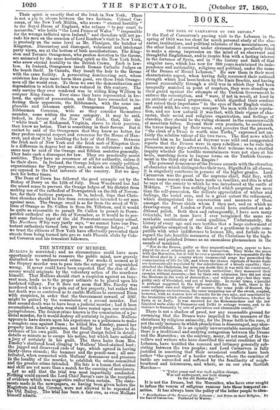• THE MYSTERY OF MURDER.
Mumixxs is convicted ; and no circumstance could. have more opportunely occurred to reassure the public mind, now gravely disturbed as to undiscovered crime. For weeks it seemed as if the Stepney murder was to pass into the category of unpunished wrong. It never could have been expected that the clue of dis- covery would originate by the voluntary action of the murderer himself. That Mullens should start a suspicion against an inno- cent man leads us to the proper estimate to be placed upon his hardenedvillany. For it does not seem that Mrs. Emsley was murdered with a view to gain out of her property, but rather that her death was so contrived as to enable Mullens to surround Exam with suspicion, in order that the Government reward. of 300/. might be gained by the commission of a second murder. But that second death was to have been a judicial murder ; had it been accomplished, &lasting stain would have rested upon our criminal jurisprudence. The foulest crime known is the commission of a ju- dicial murder, font would destroy all certainty injustice. Mnllens appears to have drawn upon his experience as a polioeman to make a complete case against Exam; he killed Mrs. Emsley, passed her property into Exam's premises, and finally led the police to the evidence of his own guilt. But the great design failed in detail ; details so minute as to escape his notice, but which have satisfied a jury of certainty in his guilt. The three hairs from Mrs. Emsley's shattered head, clinging to Mu.11ens' blood-stained boot ; the jagged and dissevered ends of tape, which agreed in having thirty-three strands; the hammer and the pencil-ease.; all cen- tributed, when connected with Mullens' demeanour and, ere,senoe in the locality of the murder, to establish the crime committed and the greater crime intended. His fate is a lesson that science and skill are yet more than a match for the cunning of murderers.
Let Us add that the trial was moat impartially conducted. Nothing could exceed the Lord Chief Baron's care in the reception of evidence which was suggestive rather thtui. certain. The state- ments made in the newspapers, as having been given before the Magistrate and the Coroner, were not allowed to be repeated at the Old Bailey. The triel has been. a fair one, aa even Mullens himself admits.


























 Previous page
Previous page